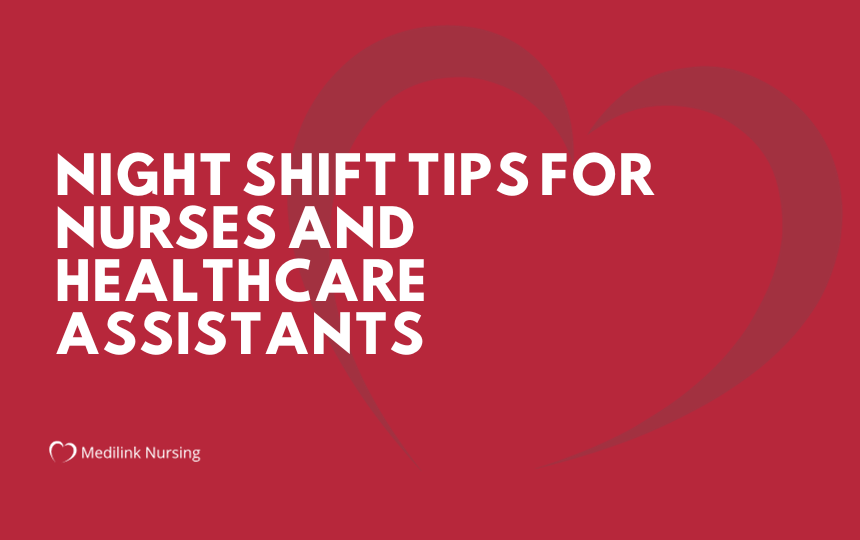Introduction: Night Shift Tips for Nurses and Healthcare Assistants
Adapting to the night shift as a nurse or healthcare assistant can be a demanding process, especially when it disrupts your natural sleep patterns. Your body, accustomed to the rhythm of day and night, requires time to adjust to a new routine. To make a transition to a night shift smoother and ensure you remain alert and effective for residents during your shifts, consider implementing these practical night shift tips for Nurses and Healthcare Assistants:
Night Shift Tips for Nurses and Healthcare Assistants – Prioritise Quality Daytime Sleep – Before And During your Night Shift
- Power Up With Strategic Naps
Before diving into your night shift, a short 30-minute nap can provide a much-needed energy boost.
- Fuel Your Body With (Healthy!) Energising Snacks
Instead of consuming a heavy meal at the start of your night shift, opt for smaller, healthy snacks throughout the night.
This approach is gentler on your digestive system, which may be more sensitive due to the change in sleep patterns. Choose snacks that provide sustained energy, such as fruits, vegetables, and whole grains.
- Stay Active And Keep Moving
Combat periods of inactivity by incorporating movement into your routine. Take regular walks around, perform stretches, or engage in light exercises to keep your blood flowing and your mind alert.
Physical activity can also help boost your mood and reduce fatigue, which can be dangerous. A night shift in a care home setting can involve a lot of admin work, but you can’t afford to let inactivity make you drowsy!
- Engage in Conversations and Stay Mentally Stimulated
Maintain mental alertness by engaging in conversations with your colleagues if possible. Sharing stories and exchanging experiences can prevent drowsiness and be a good way to share tips and tricks with your colleagues.
- Manage Caffeine Consumption Strategically
While a caffeinated beverage at the beginning of your shift can enhance alertness, be mindful of your caffeine intake later in your shift. Avoid consuming caffeine in the latter part of your shift, or else it’ll keep you up while you’re trying to rest after your shift.
For further useful hints, have a read of: Working the night shift: preparation, survival and recovery – A junior Doctor Guide which gives more tips.

A night shift in a care home is not always a quiet, calm shift as some people may assume. Staff on a night shift can be doing the below tasks, and more.
- Monitoring Residents: Staff need to regularly check on residents throughout the night to ensure they are comfortable, safe, and not distressed. This may involve conducting rounds and visually checking each resident.
- Assistance with Personal Care: Some residents may need assistance with personal care tasks such as toileting, changing, or repositioning during the night.
- Administering Medications: If residents require medication during the night, staff will be responsible for administering it according to the prescribed schedule.
- Responding to Emergencies: In the event of a medical emergency or any other urgent situation, staff must be prepared to respond quickly and appropriately. This could involve administering first aid, calling emergency services, or alerting the appropriate personnel.
As you can see, being alert and fully functioning on a night shift is ESSENTIAL.
Night Shift Tips for Nurses and Healthcare Assistants – Prioritise Quality Daytime Sleep
- Craft a Sleep-Conducive Environment
Create a calm, dark, and cool sleep environment to help your body rest effectively during the day. Minimise daytime distractions and reminders of being awake to promote better sleep quality. Put away the phone.
- Establish a Consistent Sleep Schedule
Your body thrives on routine. Develop a regular sleep schedule and stick to it as much as possible. Aim to go to bed and wake up at the same time each day, even on your days off, to facilitate a more seamless adjustment to the night shift.
Conclusion – Night Shift Tips for Nurses and Healthcare Assistants
To conclude our article, Night Shift Tips for Nurses and Healthcare Assistants, it is imperative that, if you are working a night shift as a nurse or healthcare assistant, you are not fatigued on shift.
The tips given above will help you to be able to assist residents in the care home to the best of your abilities and enjoy your shift.
Further Reading: Night Shift Tips For Nurses And Healthcare Assistants
If you found our post on “Night Shift Tips for Nurses and Healthcare Assistants” helpful, you might enjoy reading our posts on:
Our Vacancies
Medilink Nursing’s pay rates
Why you ought to join Medilink Nursing

